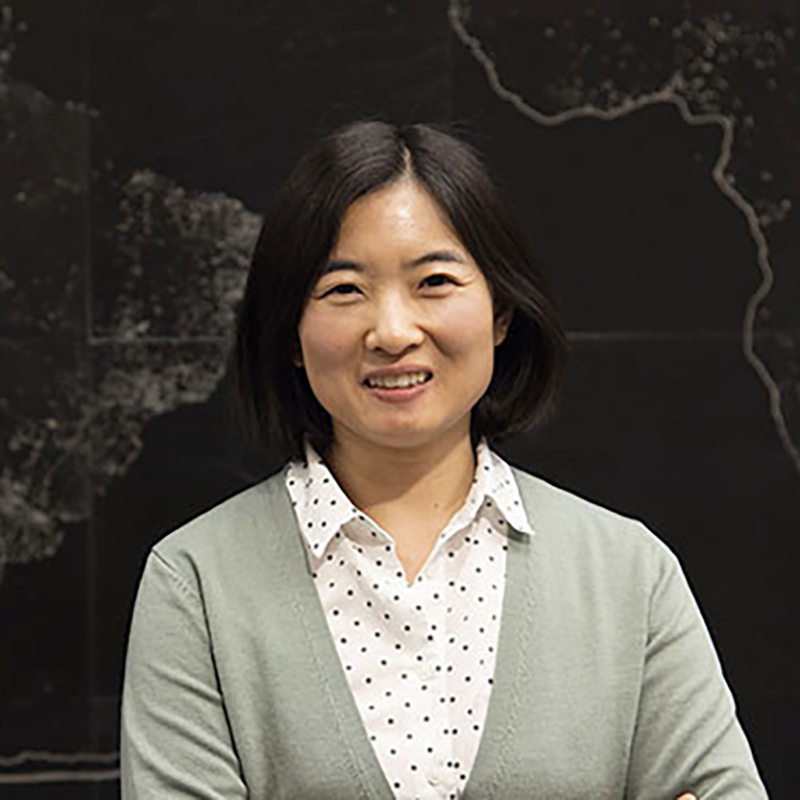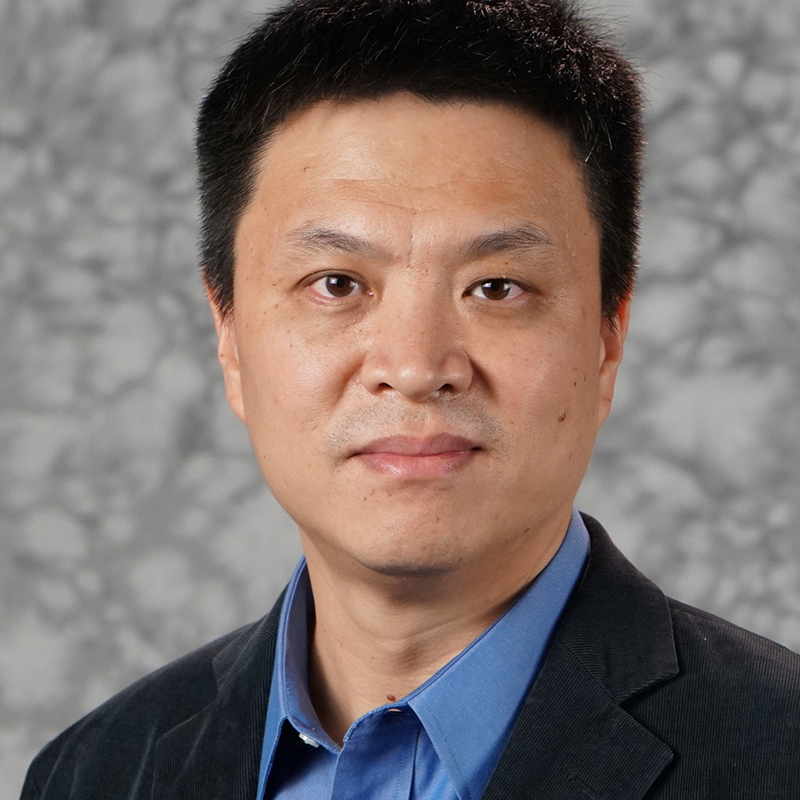News Story
ECE Recognizes 2022 Distinguished Alumni Awardees

From top left, clockwise: 2022 Department of Electrical and Computer Engineering Distinguished Alumni Awardees Zhu Han, Paul C. Hershey, Tarun Pruthi, Jennifer Roberts and Yan Lindsay Sun.
ECE Recognizes 2022 Distinguished Alumni Awardees
Award recognizes alumni who have made significant and meritorious contributions to their fields.
The University of Maryland Department of Electrical and Computer Engineering will recognize five alumni with the department’s Distinguished Alumni Award during an event held on campus on Thursday, November 3.
This year’s cohort represent accomplishments from across the various facets of the discipline and were nominated by their advising professors in recognition of their significant accomplishments.
This year’s awardees are:
Zhu Han (Ph.D. ’03)
Nominated by: Ray Liu
Zhu Han (Ph.D. ’03) is currently a John and Rebecca Moores Professor in the Electrical and Computer Engineering Department as well as in the Computer Science Department at the University of Houston, Texas.
From 2000 to 2002, he was an R&D Engineer of JDSU, Germantown, Maryland. From 2003 to 2006, he was a Research Associate at the University of Maryland. From 2006 to 2008, he was an assistant professor at Boise State University, Idaho.
His research interests include wireless resource allocation and management, wireless communications and networking, game theory, big data analysis, security, and smart grid.
Han received an NSF Career Award in 2010, the Fred W. Ellersick Prize of the IEEE Communication Society in 2011, the EURASIP Best Paper Award for the Journal on Advances in Signal Processing in 2015, IEEE Leonard G. Abraham Prize in the field of Communications Systems (best paper award in IEEE JSAC) in 2016, and several best paper awards in IEEE conferences. Dr. Han was an IEEE Communications Society Distinguished Lecturer from 2015-2018, AAAS fellow since 2019, and ACM distinguished Member since 2019. Han is a 1% highly cited researcher since 2017 according to Web of Science. Han is also the winner of the 2021 IEEE Kiyo Tomiyasu Award, for outstanding early to mid-career contributions to technologies holding the promise of innovative applications, with the following citation: “for contributions to game theory and distributed management of autonomous communication networks.”
According to his nomination, “the novel game-theory related concepts created by Zhu have been critical to enabling efficient and distributive use of wireless networks with limited resources. Game theory involves modeling and studying interactions among participants in a network.”
Han received his B.S. degree in electronic engineering from Tsinghua University, in 1997, and the M.S. and Ph.D. degrees in electrical and computer engineering from the University of Maryland, College Park, in 1999 and 2003, respectively.
Paul C. Hershey (M.S. ’84, Ph.D. ’94)
Nominated by: Charles B. Silio
Paul Hershey (M.S. ’84, Ph.D. ’94) is currently with Raytheon IIS, Dulles, Virginia, where he is a Principal Engineering Fellow focusing on data analytics, autonomous systems, cloud computing, and cyber security. He is the technical director for a key government contract, as well as the principal investigator for a major research and development project for Raytheon.
He has also served as Chief Engineer for Global Hawk Ground Systems at Raytheon and was promoted to the position of Engineering Fellow for distinguished technical achievements and expertise in the application of advanced technologies. His patents and publications support the uniqueness of his contributions, and his business success with respect to realizing these patent ideas at Raytheon, IBM, Fairchild, Tellabs, and British Telecom Research supports the usefulness of these contributions to commercial and military industries.
According to his nomination, Paul “is a systems engineering pioneer with respect to applying programmable logic devices to assist with the collection of unique patterns of data over diverse media and then analyzing those data to derive relevant information and knowledge for time-critical systems.”
His Ph.D. dissertation, entitled Information Collection Architecture (ICA), showed how to overcome many issues previously associated with deriving actionable information and knowledge from vast quantities of data available over high-speed communications and computer systems. His were among the earliest contributions to the area of “Big-Data Analytics.” ICA provides a data analytics method that combines real-time data collection and near real- time data assessment using re-programmable hardware with the speed and flexibility to adapt to changing network conditions.
He has published 39 patents (issued), with an additional 8 patent applications pending with the U.S. Patent Office, as well as publishing 69 peer reviewed technical papers on his work.
He has been an adjunct professor at George Washington University, teaching computer communications networking, and has served on their curriculum advisory board. He served on Motorola’s research visionary board, and recently recorded a 3-hour tutorial on Data Analytics for the IEEE Systems Council and served as keynote speaker for the IEEE Green Energy and Smart Systems Conference (IGESSC).
He was elevated to IEEE Fellow in 2021 for contributions to “application of data analytics to assist human decision-making."
Tarun Pruthi (Ph.D. ’07)
Nominated by: Carol Epsy-Wilson
According to his nomination, since graduating from the University of Maryland, Pruthi has “expanded his research contributions in the field of signal and speech processing and machine learning based audio algorithms in the industry. He has traced a remarkable trail of innovation, team-building and management.”
Pruthi’s contributions have not been restricted to industry and research labs. He started BISH Bash (Bay-Innovative Signal Hackers Bash), a group that has successfully organized over 25 meetups over the past eight years connecting speech and audio processing researchers in the San Francisco Bay area, and has a membership base of over 1100 researchers. He served as a reviewer for numerous journals and conferences, is a Senior Member of the Institute of Electrical and Electronics Engineers (IEEE) and has advised various startups
Jennifer M. Roberts (’04)
Nominated by: William Regli and John S. Baras
Jennifer Roberts (’04) is an industry leader with previous experience serving the Defense Advanced Research Projects Agency (DARPA) both directly and indirectly, and currently serves as the Assistant Director for Health Technologies at White House Office of Science and Technology Policy.
According to her nomination, “has made outstanding and impactful contributions to electrical engineering and computer science research and education, strategic and visionary research program creation, direction, and leadership, at the national and international levels. Her knowledge and expertise are remarkably cross-disciplinary including data science and artificial intelligence, automated machine learning, human machine symbiosis, knowledge embedding, executable protocols, cyber analytics and operations, natural language processing. Her visionary work and leadership have led to exceptional advances in many applications including synthetic biology, protein design, experimental sciences, cyber defense, solar materials, counterterrorism.”
Roberts served on the DARPA leadership team as the Deputy Director of the Information Innovation Office (2019-2021). In this role, she developed research programs and strategies in diverse areas of artificial intelligence, cross-cultural stabilization, cyber, and secure systems. For her contributions, Dr. Roberts received the DARPA Superior Public Service Medal (2021).
Roberts has also devoted considerable part of her time towards education, mentoring, and knowledge dissemination to citizens at large. She is considered a servant leader who specializes in coaching interdisciplinary teams to communicate more effectively, advising on technical strategy, and crafting efficient data analysis pipelines.
Roberts completed both her M.S. and Ph.D. at MIT after completing her B.S. at Maryland, and she also received a prestigious NSF Graduate Research Fellow and Hertz Foundation Award throughout her MIT studies.
Yan Lindsay Sun (Ph.D. ’04)
Nominated by: Ray Liu
Yan Lindsay Sun (Ph.D. ’04) is currently Professor and founding Director of the Center of Cyber-Physical Intelligence and Security (CYPHER) at the University of Rhode Island. CYPHER is one of only two centers in her college, and which received $4.6M research funding in 2021 alone.
Yan’s research interests feature multidisciplinary security solutions and include cyber-physical system security, trustworthy social computing, power grid security, and network security.
According to her nomination, “Yan contributes to fundamental theories of trust modeling and management, on which her research work has received numerous awards and recognitions.”
Yan received the best paper award from 2010 IEEE International Conference on Social Computing, the most selected and premier conference in this area with less than 10% acceptance rate. She is an IEEE Fellow and the recipient of a 2007 NSF CAREER Award for her work on trust management.
In addition, she received a 2018 Premium Award for Best Paper in IET Wireless Sensor Systems, given to recognize the best research papers published during the last two years; is the recipient of a EURASIP 2015 Best Paper Award, selected from all journals governed by the European Association for Signal Processing for proven impact and excellence; and was selected as 40 Under 40 by Providence Business News in 2015. She also received the best paper awards at 2020 IEEE Power & Energy Society General Meeting, and 2014 IEEE International Conference on Communications.
Yan was the Editor-in-Chief of IEEE SPS SigPort (2015–2017) and an associate editor of IEEE Transactions on Signal and Information Processing over Networks. She was an elected member of the Information Forensics and Security Technical Committee (2014-2016), served on the editorial broad of IEEE Security and Privacy Magazine (2013-2015), an associate editor of Signal Processing Letter (2013-2015), and the general chair of IEEE Workshop on Information Forensics and Security (WIFS) in 2014.
In addition to her professional work, she serves on both her educational school board to actively participate and contribute to the local community and on Congressman Langevin’s Cybersecurity Advisory Board.
The Department of Electrical and Computer Engineering established the Distinguished Alumni Award in 2011 to recognize alumni who have made significant and meritorious contributions to their fields.
Published October 27, 2022








